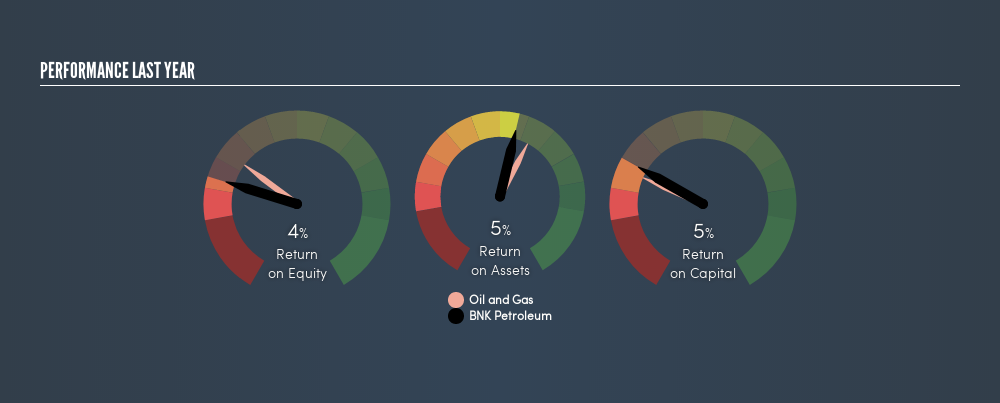
Today we'll evaluate BNK Petroleum Inc. (TSE:BKX) to determine whether it could have potential as an investment idea. In particular, we'll consider its Return On Capital Employed (ROCE), as that can give us insight into how profitably the company is able to employ capital in its business.
Firstly, we'll go over how we calculate ROCE. Second, we'll look at its ROCE compared to similar companies. And finally, we'll look at how its current liabilities are impacting its ROCE.
What is Return On Capital Employed (ROCE)?
ROCE measures the 'return' (pre-tax profit) a company generates from capital employed in its business. In general, businesses with a higher ROCE are usually better quality. Ultimately, it is a useful but imperfect metric. Renowned investment researcher Michael Mauboussin has suggested that a high ROCE can indicate that 'one dollar invested in the company generates value of more than one dollar'.
So, How Do We Calculate ROCE?
The formula for calculating the return on capital employed is:
Return on Capital Employed = Earnings Before Interest and Tax (EBIT) ÷ (Total Assets - Current Liabilities)
Or for BNK Petroleum:
0.048 = US$7.5m ÷ (US$165m - US$7.8m) (Based on the trailing twelve months to December 2018.)
Therefore, BNK Petroleum has an ROCE of 4.8%.
View our latest analysis for BNK Petroleum
Is BNK Petroleum's ROCE Good?
When making comparisons between similar businesses, investors may find ROCE useful. Using our data, BNK Petroleum's ROCE appears to be around the 5.6% average of the Oil and Gas industry. Independently of how BNK Petroleum compares to its industry, its ROCE in absolute terms is low; especially compared to the ~1.9% available in government bonds. There are potentially more appealing investments elsewhere.

When considering this metric, keep in mind that it is backwards looking, and not necessarily predictive. Companies in cyclical industries can be difficult to understand using ROCE, as returns typically look high during boom times, and low during busts. This is because ROCE only looks at one year, instead of considering returns across a whole cycle. Given the industry it operates in, BNK Petroleum could be considered cyclical. You can check if BNK Petroleum has cyclical profits by looking at this freegraph of past earnings, revenue and cash flow.
BNK Petroleum's Current Liabilities And Their Impact On Its ROCE
Current liabilities include invoices, such as supplier payments, short-term debt, or a tax bill, that need to be paid within 12 months. The ROCE equation subtracts current liabilities from capital employed, so a company with a lot of current liabilities appears to have less capital employed, and a higher ROCE than otherwise. To check the impact of this, we calculate if a company has high current liabilities relative to its total assets.
BNK Petroleum has total liabilities of US$7.8m and total assets of US$165m. Therefore its current liabilities are equivalent to approximately 4.8% of its total assets. BNK Petroleum has a low level of current liabilities, which have a negligible impact on its already low ROCE.
Our Take On BNK Petroleum's ROCE
Nonetheless, there may be better places to invest your capital. Of course, you might find a fantastic investment by looking at a few good candidates. So take a peek at this freelist of companies with modest (or no) debt, trading on a P/E below 20.
If you are like me, then you will not want to miss this freelist of growing companies that insiders are buying.
We aim to bring you long-term focused research analysis driven by fundamental data. Note that our analysis may not factor in the latest price-sensitive company announcements or qualitative material.
If you spot an error that warrants correction, please contact the editor at editorial-team@simplywallst.com. This article by Simply Wall St is general in nature. It does not constitute a recommendation to buy or sell any stock, and does not take account of your objectives, or your financial situation. Simply Wall St has no position in the stocks mentioned. Thank you for reading.
About TSX:KEI
Kolibri Global Energy
Engages in the exploration and exploitation of oil, gas, and clean and sustainable energy reserves in the United States.
Undervalued with reasonable growth potential.
Market Insights
Community Narratives



